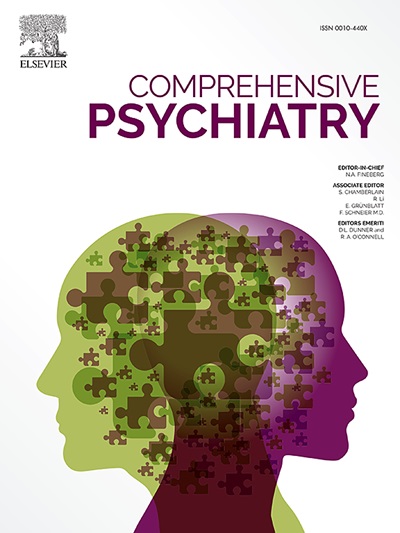Correlates of risk-taking behaviour and suicidality among humanitarian aid workers
IF 4.2
2区 医学
Q1 PSYCHIATRY
引用次数: 0
Abstract
In an era of high need for humanitarian assistance, humanitarian aid workers face increased exposure to potentially traumatic events and, correspondingly, a greater risk of psychological distress (e.g., anxiety, depression, posttraumatic stress disorder [PTSD], and burnout). Less studied among humanitarian workers, however, are other known correlates of trauma-exposure: complex PTSD, risk-taking behaviours, and suicidality. The current study examined levels of trauma exposure and rates of trauma-related mental health disorders, risk-taking behaviour, and levels of suicidality among a sample (N = 232) of humanitarian workers located across 52 countries. Multiple linear regression analysis was used to determine which demographic (i.e., sex, age, cadre, years working as an aid worker), psychological (i.e., social support, personality traits), and trauma-related (trauma exposure, complex posttraumatic stress disorder [CPTSD] symptoms, and dissociation) variables were uniquely associated with risk-taking behaviours and suicidality. Overall, 12.9 % (95 % CI = 8.5 %, 17.2 %) of humanitarian workers met the diagnostic requirements for PTSD, and 8.6 % (95 % CI = 5.0 %, 12.2 %) met requirements for CPTSD. Higher risk-taking behaviours were significantly associated with being male, an international worker, greater trauma exposure, extraversion, neuroticism, and CPTSD symptoms. Suicidality was significantly associated with being an international staff member and higher levels of dissociation. Results are consistent with previous studies citing a high risk of psychological distress among humanitarian workers. Humanitarian aid agencies have a duty of care to their workers - both professional and volunteer - and greater safeguarding measures are necessary to mitigate the risk to mental health brought on by humanitarian work-related stressors.
人道主义援助工作者冒险行为和自杀倾向的相关因素。
在人道主义援助需求高涨的时代,人道主义援助工作者面临着更多潜在创伤事件的风险,相应地,也面临着更大的心理困扰风险(如焦虑、抑郁、创伤后应激障碍(PTSD)和职业倦怠)。然而,在人道主义工作者中,对创伤暴露的其他已知相关因素研究较少:复杂创伤后应激障碍、冒险行为和自杀倾向。本研究调查了位于 52 个国家的人道主义工作者样本(样本数 = 232)中的创伤暴露程度、与创伤相关的心理健康疾病发病率、冒险行为和自杀程度。我们采用多元线性回归分析来确定哪些人口统计学变量(即性别、年龄、干部、援助工作者工作年限)、心理学变量(即社会支持、人格特质)和创伤相关变量(创伤暴露、复杂创伤后应激障碍 [CPTSD] 症状和分离)与冒险行为和自杀倾向有独特的关联。总体而言,12.9%(95% CI = 8.5%,17.2%)的人道主义工作者符合创伤后应激障碍的诊断要求,8.6%(95% CI = 5.0%,12.2%)符合复杂创伤后应激障碍的诊断要求。较高的冒险行为与男性、国际工作人员、较多的创伤暴露、外向性、神经质和 CPTSD 症状有显著关联。自杀行为与国际工作人员身份和较高的解离程度有很大关系。这些研究结果与之前的研究结果一致,即人道救援人员面临着较高的心理压力风险。人道主义援助机构有责任照顾其工作人员(包括专业人员和志愿者),因此有必要采取更多的保障措施,以降低与人道主义工作相关的压力给心理健康带来的风险。
本文章由计算机程序翻译,如有差异,请以英文原文为准。
求助全文
约1分钟内获得全文
求助全文
来源期刊

Comprehensive psychiatry
医学-精神病学
CiteScore
12.50
自引率
1.40%
发文量
64
审稿时长
29 days
期刊介绍:
"Comprehensive Psychiatry" is an open access, peer-reviewed journal dedicated to the field of psychiatry and mental health. Its primary mission is to share the latest advancements in knowledge to enhance patient care and deepen the understanding of mental illnesses. The journal is supported by a diverse team of international editors and peer reviewers, ensuring the publication of high-quality research with a strong focus on clinical relevance and the implications for psychopathology.
"Comprehensive Psychiatry" encourages authors to present their research in an accessible manner, facilitating engagement with clinicians, policymakers, and the broader public. By embracing an open access policy, the journal aims to maximize the global impact of its content, making it readily available to a wide audience and fostering scientific collaboration and public awareness beyond the traditional academic community. This approach is designed to promote a more inclusive and informed dialogue on mental health, contributing to the overall progress in the field.
 求助内容:
求助内容: 应助结果提醒方式:
应助结果提醒方式:


